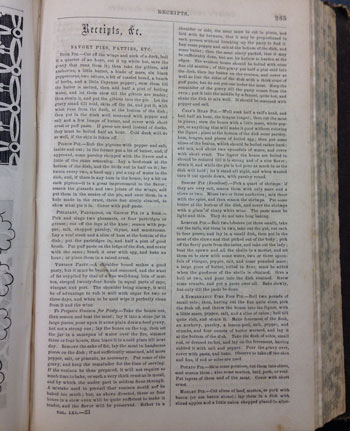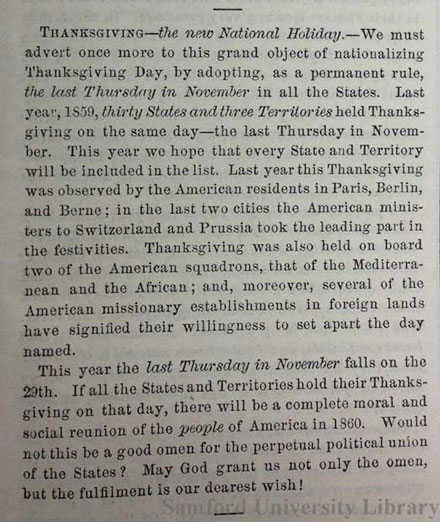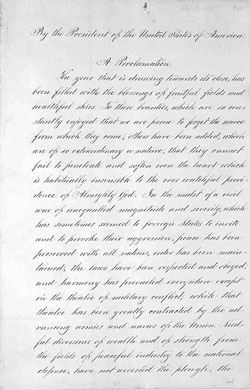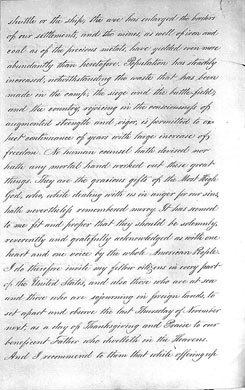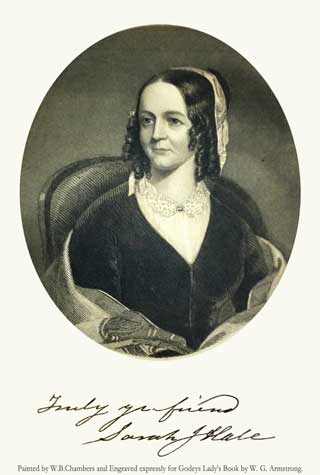
Painted W. B. Chambers and Engraved expressly for Godey's Lady's Book
Most people are familiar with the story of the pilgrims and Thanksgiving. However, Thanksgiving didn't become a nationally recognized annual holiday for almost 200 years. During that time, territories and states all celebrated the Thanksgiving holiday individually, if at all.
Beginning in 1837 Sarah J. Hale, author of the nursery rhyme "Mary Had a Little Lamb", began a campaign to have Thanksgiving designated as a national holiday. In the 19th century, Mrs. Hale was also a well-known editor for the popular women's magazine Godey's Lady's Book. While working with the magazine, she published recipes and wrote numerous editorials urging national leaders to unite the country by making Thanksgiving a national holiday.
In the years preceding the Civil War, Hale believed Thanksgiving, as a national holiday, could bring unity to a struggling nation. In 1859 she wrote,
OUR THANKSGIVING UNION –The last Thursday in November–will it not be a great day in our Republic? Seventy years ago the political union of the United States was consummated; in 1789, the thirteen individual States, then forming the American Confederacy, became, by the ratification of the Constitution, over the forming of which Washington himself presided, the United American Nation. The flag of our country now numbers thirty-two stars on its crown of blue, and some half dozen or more additional starlets are shining out of the depths of our wilderness continent, soon to be added to our system of independent and united Government of the People. God save the United States! He has saved, enlarged, blessed, and prospered us beyond any people on this globe. Should we not be thankful, and keep High Holiday of gratitude and gladness in acknowledgment of these national blessings? Seventy years ago, there were only about three millions of people under our flag; now it waves its protecting folds from the Atlantic to the Pacific, and nearly thirty millions of souls are enjoying its blessings. If every State should join in union thanksgiving on the 24th of this month, would it not be a renewed pledge of love and loyalty to the Constitution of the United States, which guarantees peace, prosperity, progress, and perpetuity to our great Republic?Sarah Hale
After the Civil War began, Hale did not give up her fight for Thanksgiving. In an 1863 editorial she argued, "Would it not be of great advantage, socially, nationally, religiously, to have the DAY of our American Thanksgiving positively settled? Putting aside the sectional feelings and local incidents that might be urged by any single State or isolated Territory that desired to choose its own time, would it not be more noble, more truly American, to become nationally in unity when we offer to God our tribute of joy and gratitude for the blessings of the year? Taking this view of the case, would it not be better that the proclamation which appoints Thursday the 26th of November as the day of Thanksgiving for the people of the United States of America should, in the first instance, emanate from the President of the Republic to be applied by the Governors of each and every State, in acquiescence with the chief executive adviser?"
During her fight for Thanksgiving, Hale wrote letters to five different presidents. In September of 1863 Hale wrote a letter addressing Abraham Lincoln, in which she pleaded, "the purpose of this letter is to entreat President Lincoln to put forth his Proclamation, appointing the last Thursday in November (which falls this year on the 26th) as the National Thanksgiving for all those classes of people who are under the National Government particularly, and commending this Union Thanksgiving to each State Executive: thus, by the noble example and action of the President of the United States, the permanency and unity of our Great American Festival of Thanksgiving would be forever secured. An immediate proclamation would be necessary, so as to reach all the States in season for State appointments, also to anticipate the early appointments by Governors."
Her letter addressing President Lincoln brought the response for which she had long hoped. On October 3, 1863 Lincoln issued a proclamation urging all Americans to observe the last Thursday in November as a day of thanksgiving.
Thanks in part to Sarah Hale, since 1863 every state in the nation has celebrated a day of Thanksgiving together. On December 26, 1941, President Roosevelt singed a bill into law that Thanksgiving would occur annually on the fourth Thursday of November.
Resources
- Godey's Lady's Book
- National Archives, The National Archives Celebrates Thanksgiving. Press release: Tuesday, November 24, 2009.
- National Archives, The National Archives Celebrates Thanksgiving. Press release: Wednesday, November 16, 2011.


